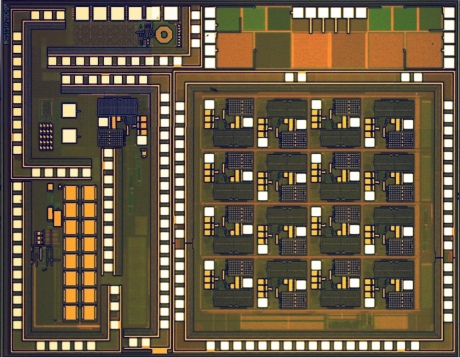Virtual gallery showcases the silicon chips behind a revolution in healthcare
by Colin Smith

A new Instagram series will show off the surprising beauty of the silicon chips being developed by researchers at Imperial to improve health.
A silicon chip that can form a bridge to connect severed nerves together in people with spinal injuries and a chip that could help patients with locked in syndrome to communicate with the outside world are some of the prototypes that will be showcased in the Instagram campaign, which starts tomorrow (30 January).
As well as offering hope to patients, these miniature chips are startlingly beautiful with brightly coloured circuitry and geometric designs. On close inspection, each chip even has its own logo such as “The Ninja”, which is reminiscent of the street art that you may see in Bristol. These logos are a cool way of letting other engineers know who designed each chip.
The silicon chips are designed and developed by academics and postgraduates from the Centre for Bio-Inspired Technology in Imperial’s Department of Electrical & Electronic Engineering. The aim of the Instagram campaign is to celebrate the craftsmanship of the researchers behind the silicon circuitry and the ground-breaking work that they are doing, which could revolutionise healthcare in the future. As part of the campaign a new image will be revealed each working day, over 19 days.
Imperial’s Instagram handle is @imperialcollege.
Professor Chris Toumazou, Director of the Centre for Bio-inspired Technology, said: “A few years back when the Queen came to our labs she remarked that a print of a painting by Piet Mondrian hanging on the wall looked very similar to the silicon chips that we are developing at the Centre. These chips serve a purely functional purpose. However, on close inspection you can see that the silicon chips have an architectural quality to them, which could be admired from an artistic point of view. I hope this campaign shows the precision engineering that researchers at the Centre are doing and I encourage everyone to log on to Instagram and enjoy the images in our virtual silicon chip gallery.”
Dr Tim Constandinou, Deputy Director of the Centre for Bio-Inspired Technology, adds: “Silicon chip technologies will have a massive impact on the way patients are looked after. It will enable treatments to be more tailored and personalised to the needs of the individual, making therapies targeted and cost effective. At the Centre, we are training the next generation of engineers who are designing the technologies to make this future a reality. It is not often that we get to celebrate the precision engineering behind the medical technologies of the future, so it is great that our Instagram campaign is giving us that opportunity – please enjoy!”
Here is a sneak peak of some of the images that will go on Instagram.

Researchers from the Centre are working towards developing new methods for understanding the human brain. This first generation implantable silicon chip can record brain activity in real-time and wirelessly transmit the information to a receiver. This could ultimately help those living with conditions such as locked in syndrome, where patients cannot move or communicate, to reconnect and communicate with the outside world.

People with spinal cord injuries have severed nerves, which prevents information being relayed up and down the spine, resulting in paralysis. Researchers from the Centre have developed this prototype silicon chip that connects to a severed nerve so that electrical signals can be relayed again. The ultimate aim of this project is to help people living with paraplegia to regain movement.
Article text (excluding photos or graphics) © Imperial College London.
Photos and graphics subject to third party copyright used with permission or © Imperial College London.
Reporter
Colin Smith
Communications and Public Affairs